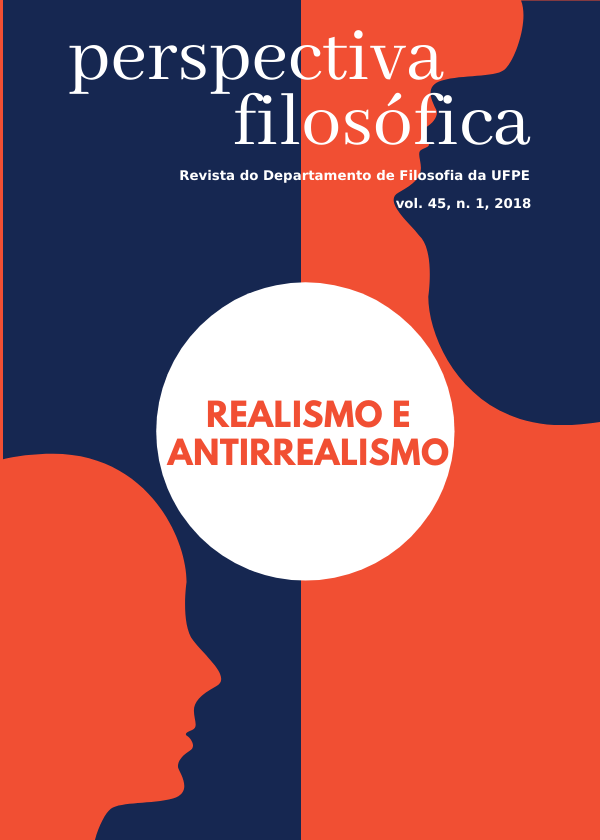J. L. Austin e Alvin Goldman: conhecimento empírico e alternativas relevantes
DOI:
https://doi.org/10.51359/2357-9986.2018.230296Keywords:
John L. Austin, Alvin Goldman, empirical knowledge, discrimination, relevant alternativesAbstract
Our aim in this paper is to discuss the empirical knowledge such as John L. Austin and Alvin Goldman’s theories. For this, we will argue that the traditional definition of knowledge (justified true belief) is insufficient to deal with empirical knowledge. We will argue that the proper way to analyze the empirical knowledge must take into account the ability of the cognizer to discriminate an empirical proposition p from relevant alternatives to the case.References
AUSTIN, J. L. Outras Mentes. In Coleção os pensadores. São Paulo-SP, Abril Cultural, 1980.
AUSTIN, J. L. Sentido e Percepção. São Paulo-SP, Ed. Martins Fontes, 2004.
DANCY, Jonathan. Epistemologia Contemporânea. Lisboa: Edições 70, 1985.
DESCARTES, René. Meditações. São Paulo: Abril Cultural, 1973.
GAIL, Stine. Skepticism, Relevant Alternatives, and Closure. In: PhilosophicalStudies 29: p. 249 – 261. 1976. Reimpresso em: Keith DeRose andTed A.Warfield eds., Skepticism: A Contemporary Reader. New York Oxford: OxfordUniversity Press: p. 145–155. 1999.
GOLDMAN,Alvin. Discrimination and Perceptual Knowledge. The Journal ofPhilosophy 73: 771-791. 1976. Reimpresso em: Moser, Paul K and Vander Nat,eds., Human Knowledge: Classical and Contemporary Approaches, OxfordUniversity Press: 269-281. 1987.
GOLDMAN,Alvin. What is Justified Belief?In: Justification and Knowledge,George S. Pappas, ed. Dordrecht: Reidel. 1-23.1979.
GOLDMAN,Alvin. Epistemology and Cognition. Cambridge: Harvard UniversityPress. 1986.
HUME, David. Tratado da Natureza Humana. 2ª Ed. São Paulo: Editora UNESP, 2009.
LEWIS, David. Elusive Knowledge. Australasian Journal of Philosophy 74: p.549-567. Reimpresso em: Keith DeRose and Ted A. Warfield eds., Skepticism:A Contemporary Reader. New York Oxford: Oxford University Press: p. 220-239.1999.
MOORE, G. E. Certainty. In: Philosophical Papers. New York: Ed. Collier Books,1962. [p. 223 – 246].
MOSER, P; MULDER, D & TROUT, J. D. A Teoria do Conhecimento – Uma Introdução temática. São Paulo: Martins Fontes, 2004.
PORCHAT, O. Vida comum e ceticismo. São Paulo-SP, Editora Unesp, 2007.
RASMUSSEN, D. B. Austin and Wittgenstein on “doubt” and “knowledge”. ReasonPapers nº I. Marquette University. 1974.
SCHAFFER, J. From contextualism to contrastivism. Philosophical Studies 119(1–2): 73–103. 2004.
SCHAFFER, J. Contrastive knowledge. In Oxford studies in epistemology 1, editedby T. Gendler and J. Hawthorne, pp. 235–72. Oxford: Oxford UniversityPress. 2005.
STROUD, Barry. El Escepticismo Filosófico y su Significación. México (DF): Ed.Fondo de Cultura Económica, 1990.
UNGER, Peter. Ignorance: a Case for Scepticism.Oxford: Oxford university press,1975.
WILLIANS, Michael. Ceticismo. inCompêndio de Epistemologia. São Paulo-SP,Edições Loyola, 2012.
Downloads
Published
Issue
Section
License
A Revista Perspectiva Filosófica orienta seus procedimentos de gestão de artigos conforme as diretrizes básicas formuladas pelo Conselho Nacional de Desenvolvimento Científico e Tecnológico (CNPq). http://www.cnpq.br/web/guest/diretrizesAutores que publicam nesta revista concordam com os seguintes termos:
Os autores mantém os direitos autorais e concedem à revista o direito de primeira publicação, sendo o trabalho simultaneamente licenciado sob https://creativecommons.org/licenses/by/4.0/deed.pt_BR que permite o compartilhamento do trabalho com reconhecimento da autoria e publicação inicial nesta revista.
Os autores têm autorização para assumir contratos adicionais separadamente, para distribuição não-exclusiva da versão do trabalho publicada nesta revista, com reconhecimento de autoria e publicação inicial nesta revista (Consultar http://opcit.eprints.org/oacitation-biblio.html).

Esta revista está licenciada com uma Licença Creative Commons Atribuição 4.0 Internacional.













